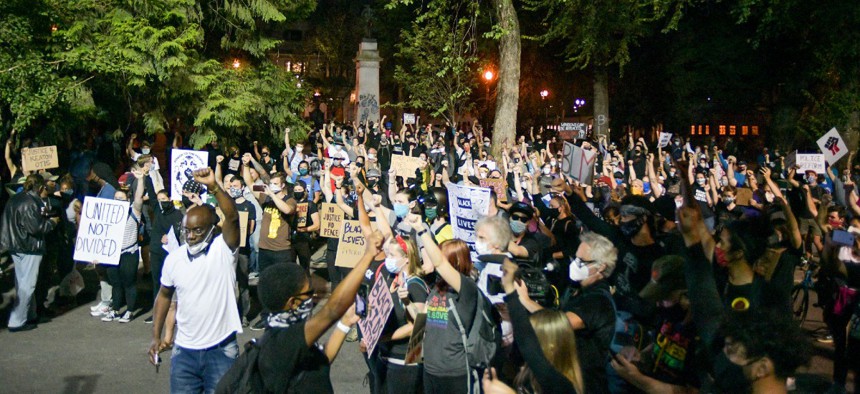Lawmakers: Did DHS Surveil Portland Protesters’ Phones?

Black Lives Matter protest peacefully after federal officers scale back at Mark O. Hatfield United States Court House in Portland, Oregon on August 1. Damairs Carter/MediaPunch /IPX
Lawmakers want to know if federal agencies intercepted messages or collected cellphone data—including through commercial sources—during Portland protests.
Following reports the Homeland Security Department, potentially along with other federal agencies, conducted electronic surveillance of protesters’ cellphones in Portland, a group of Oregon lawmakers is demanding answers from the agency’s top official.
Oregon Democrats Sens. Ron Wyden and Jeff Merkley and Reps. Earl Blumenauer and Suzanne Bonamici wrote to Chad Wolf, the embattled acting DHS secretary, Thursday. The letter asked four questions based on a report by The Nation’s Ken Klippenstein alleging DHS and potentially other federal agencies tapped Portland protesters’ phones.
Since the extrajudicial killing of George Floyd by a Minneapolis police officer in May, protesters against police violence and systemic racism have taken to the streets in cities and towns across the United States. Portland became an unlikely protest hub over the summer.
Klippenstein’s report, based largely on conversations with anonymous current and former DHS officials, alleges DHS, the Justice Department and potentially other agencies sent officials to Portland who extracted information from cellphones by copying the device’s unique identifier to another device, enabling officials to intercept phone communications between protesters.
“Congress has enacted strict legal protections which require government agencies to obtain the approval of an independent judge before searching Americans’ devices and surveilling their communications—absent an emergency,” the lawmakers’ letter reads. “That is to prevent the government from suppressing legitimate free speech protected by the First Amendment and violating Americans’ right to privacy, which is protected by the Fourth Amendment.”
Previously, the top DHS official in charge of Intelligence and Analysis, Brian Murphy, told Congress DHS did not engage in the exploitation or analysis of protesters’ devices. Lawmakers including Wyden shortly thereafter wrote a letter to DHS asking the agency to confirm the veracity of Murphy’s statement.
But DHS never replied; the first question in this latest letter requests DHS to indicate whether Murphy’s statement was accurate at the time and whether it is still accurate now. Murphy has since been removed from his I&A position.
The other three questions address the latest allegations that U.S. government officials engaged in illegal high tech surveillance. The second question asks whether DHS “obtained or analyzed” data from protesters’ phones. The next question goes deeper, asking DHS whether data collected via surveillance included location tracking data, intercepting communications content or metadata.
The lawmakers also ask whether DHS used commercial data sources to surveill protestors. In February, The Wall Street Journal reported DHS purchased cellphone location data from private companies in order to track activity near the U.S.-Mexico, which reportedly led to arrests related to border crossings. Commercial data sources can also include tools that aggregate publicly available information on users, called open source intelligence products. The letter requests DHS identify all commercial data sources the agency used, describe what information that data included as well as how DHS utilized it in the context of the protests.
In addition, the lawmakers ask whether DHS shared any of the data it collected and/or analyzed with other government agencies. For all three queries, lawmakers asked a key question: whether the agency received court approval to conduct its surveillance activities. For mining cellphones, the lawmakers asked DHS to indicate whether it received authorization from a judge for each individual cellphone it may have surveilled.
The lawmakers requested answers by October 9.
The Nation story is the latest in a series of reports that DHS has responded to nationwide protests over police brutality poorly. Unmarked federal agents, reportedly including DHS personnel, allegedly detained protesters in Portland.
Oregon Public Broadcasting in July reported U.S. Marshals Special Operations Group and Customs and Border Protection officials were sent to Portland to protect federal property during protests, but interviews showed these officers detained protesters who weren’t near federal property or even engaging in criminal activity.
The Oregon Justice Department is now suing federal agencies including CBP, the Marshal Service and DHS for civil rights abuses related to the protest activity.
On Wednesday, DHS reportedly flew surveillance aircraft over Louisville, Kentucky, where protesters gathered after a grand jury declined to indict police officers for the killing of Breonna Taylor, according to a VICE report based on Air Traffic Control feed activity.
News of government agencies participating in surveillance of U.S. citizens also comes to light as momentum for passage of federal data privacy legislation builds.
Kara Frederick, a fellow at the Center for New American Security, published a report earlier this month outlining how the U.S. and its allies should counter anti-democratic uses of surveillance technologies across the world. Frederick recommended the U.S. enshrine data privacy protections in law.
In the report, Frederick wrote “any government use of surveillance technology in the United States should require keeping the public informed on how their personal information is being used and protected.” She added government collection of personal data should be constrained by time limits for storage.
The Senate Commerce, Science and Transportation Committee held a hearing September 23 to examine the need for federal data privacy legislation. The week prior, Sen. Roger Wicker, R-Miss., and a group of Commerce Committee Republicans introduced national privacy legislation.
The Setting an American Framework to Ensure Data Access, Transparency, and Accountability, or SAFE DATA, Act aims to give U.S. citizens more control of their personal data, and would empower the Federal Trade Commission to enforce privacy protections.
But the bill, like other similar legislation, does not cover data collection practices by federal agencies, only private businesses.






